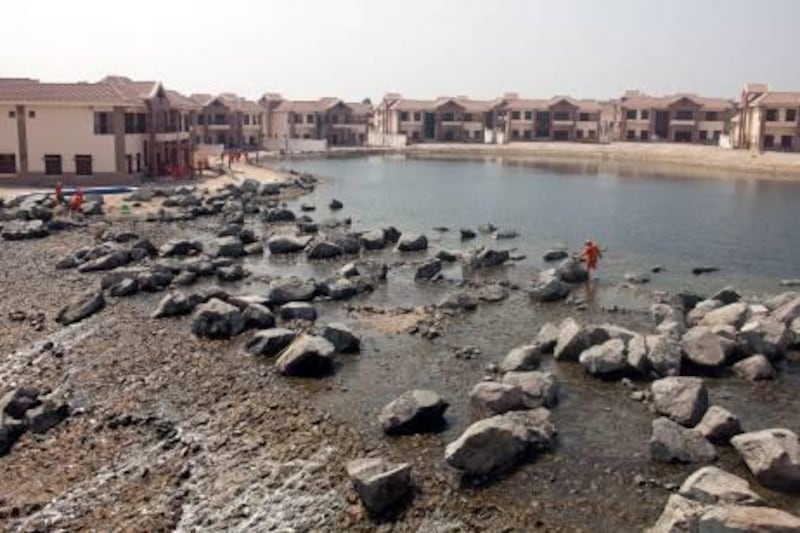DUBAI // A lake encircling the Jumeirah Islands villa complex contains far higher levels of ammonia than is deemed acceptable by Dubai authorities, an independent laboratory test shows.
Samples from the lake showed an ammonia level of 17.4 milligrams per litre, three times higher than the amount allowed by the Dubai Municipality for "bodies of water that discharge to land".
For over a year residents have complained about swarms of mosquitoes, clumps of algae and an unpleasant smell coming from the lake.
Nakheel, the developer of Jumeirah Islands, has acknowledged the problem and says it is fixing it.
"It's like a big algae pond, and the smell is terrible," said one resident who has lived in the luxury development for many years and, like other residents, asked not to be named.
The lake is a central feature of the development, wending around its 700 villas housed on 60 clusters. Its water is drawn from the Gulf and is meant to be pumped in and out daily to prevent stagnation and side effects such as mosquitoes and algae.
Nakheel, which developed and maintains Jumeirah Islands, said the test results did not indicate a threat to residents.
"Whilst we cannot comment on a particular sample ... in any event, the ammonia level cannot cause risk to humans," a spokesman said.
The test was conducted by Inspectorate International, an independent accredited laboratory with 200 branches worldwide, from a sample provided by The National. The results were measured against the limits set by the Dubai Municipality for "water that discharges to land" - the category most similar to lake water.
The amount of "total dissolved solids" - which cause water to become "hard" - exceeds the official limit of 1,500 milligrams per litre by more than 30 times, at 50,400 milligrams. These solids can clog the underground pipes used to keep the water circulating. The amount of "total suspended solids" - which discolour the water - is 91 milligrams per litre, nearly twice the legal amount of 50 milligrams. These can derive from waste thrown into the water and not cleaned up, or from leaves that drift in.
"The water in the lake was dirty and coloured when the samples were being collected," said an official at Inspectorate International.
In addition to discolouration, greenish algae coats the edges of the lake - often just steps away from homes.
Lining the shore are rows of older, whitened algae that has been extracted out but not discarded.
In a wide expanse like a lake, ammonia can emit a pungent odour and might even aggravate respiratory conditions like asthma, especially in children. It is just one of several chemicals found in excess in the water.
Several residents said the stagnant water attracted mosquitoes. "We have a lot in the winter. At times it's so bad that we can't sit outside," said another resident.
Mosquito larvae and other microbiological contaminants were not found in the test, but that might be because the lake is still too hot for them to survive, said Mohamed Raouf, an environmental expert at the Gulf Research Centre. They might well be found during the winter, when the temperature drops.
"If they had enough mixing of the water, the whole problem could be solved very easily. It's not an ideal situation from a health point of view. Obviously it will be uncomfortable," said Walid Saleh, the regional co-ordinator of United Nations University and an expert at its Institute for Water, Environment and Health.
"These people paid a lot of money to overlook a body of water. They don't want this in their backyard," he said.
Dubai Municipality did not respond to requests for comment.
Nakheel blamed the lack of water flow on problems outside the community and promised it would be fixed.
"The issues are due, in general, to a lack of circulation with the main contributing [factors] external to Jumeirah Islands," the spokesman said.
"We have taken measures to stop further effects and are working to improve the circulation."
An e-mail from Nakheel sent to residents a year ago said, "The lake rectification works are proceeding. The water quality continues to improve and salinity levels are increasing which in turn results in the natural eradication of the algae," the letter said.
But residents insist the problem is as bad as ever.
"The water used to be clean but now it's so dirty," said one long-time resident. "It's such a shame."
[ chuang@thenational.ae ]





